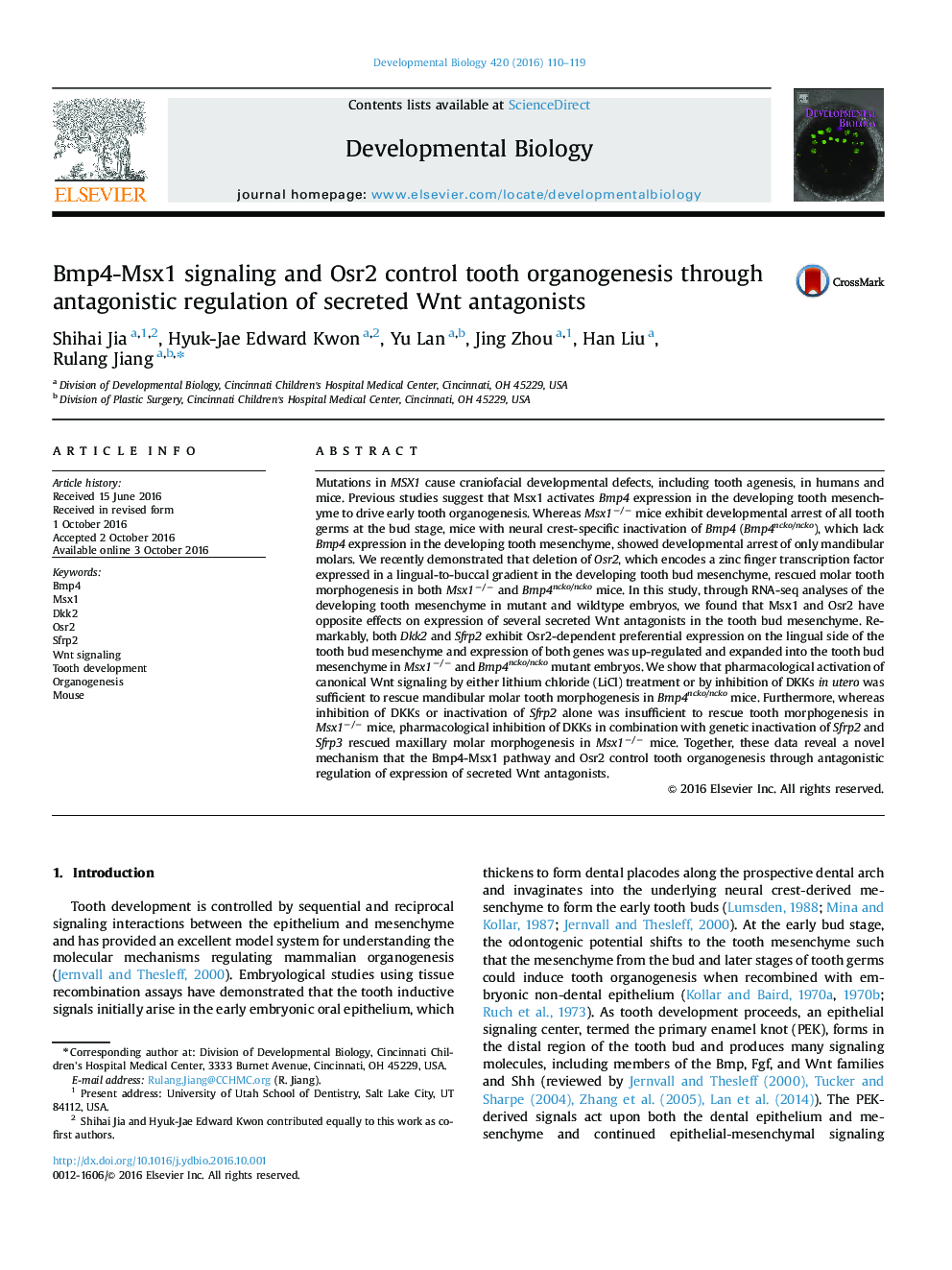| کد مقاله | کد نشریه | سال انتشار | مقاله انگلیسی | نسخه تمام متن |
|---|---|---|---|---|
| 5532043 | 1401827 | 2016 | 10 صفحه PDF | دانلود رایگان |

- RNA-seq analyses of effects of Msx1 and Osr2 on tooth developmental gene expression.
- Osr2 upregulates expression of Dkk2 and Sfrp2 in tooth bud mesenchyme.
- The Bmp4-Msx1 pathway suppresses expression of Dkk2 and Sfrp2 in tooth mesenchyme.
- Dkk inhibitor rescues tooth development in mice lacking Bmp4 in tooth mesenchyme.
- Inhibition of Dkk and Sfrp2/3 partly rescues molar development in Msx1-/- mice.
Mutations in MSX1 cause craniofacial developmental defects, including tooth agenesis, in humans and mice. Previous studies suggest that Msx1 activates Bmp4 expression in the developing tooth mesenchyme to drive early tooth organogenesis. Whereas Msx1â/â mice exhibit developmental arrest of all tooth germs at the bud stage, mice with neural crest-specific inactivation of Bmp4 (Bmp4ncko/ncko), which lack Bmp4 expression in the developing tooth mesenchyme, showed developmental arrest of only mandibular molars. We recently demonstrated that deletion of Osr2, which encodes a zinc finger transcription factor expressed in a lingual-to-buccal gradient in the developing tooth bud mesenchyme, rescued molar tooth morphogenesis in both Msx1â/â and Bmp4ncko/ncko mice. In this study, through RNA-seq analyses of the developing tooth mesenchyme in mutant and wildtype embryos, we found that Msx1 and Osr2 have opposite effects on expression of several secreted Wnt antagonists in the tooth bud mesenchyme. Remarkably, both Dkk2 and Sfrp2 exhibit Osr2-dependent preferential expression on the lingual side of the tooth bud mesenchyme and expression of both genes was up-regulated and expanded into the tooth bud mesenchyme in Msx1â/â and Bmp4ncko/ncko mutant embryos. We show that pharmacological activation of canonical Wnt signaling by either lithium chloride (LiCl) treatment or by inhibition of DKKs in utero was sufficient to rescue mandibular molar tooth morphogenesis in Bmp4ncko/ncko mice. Furthermore, whereas inhibition of DKKs or inactivation of Sfrp2 alone was insufficient to rescue tooth morphogenesis in Msx1â/â mice, pharmacological inhibition of DKKs in combination with genetic inactivation of Sfrp2 and Sfrp3 rescued maxillary molar morphogenesis in Msx1â/â mice. Together, these data reveal a novel mechanism that the Bmp4-Msx1 pathway and Osr2 control tooth organogenesis through antagonistic regulation of expression of secreted Wnt antagonists.
172
Journal: Developmental Biology - Volume 420, Issue 1, 1 December 2016, Pages 110-119